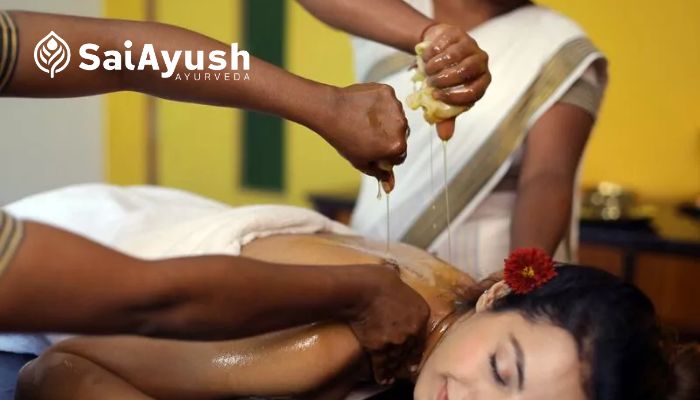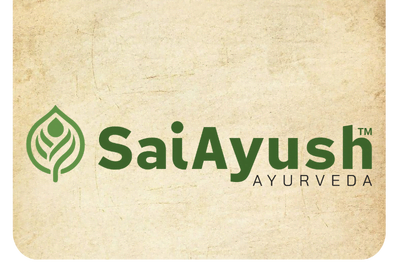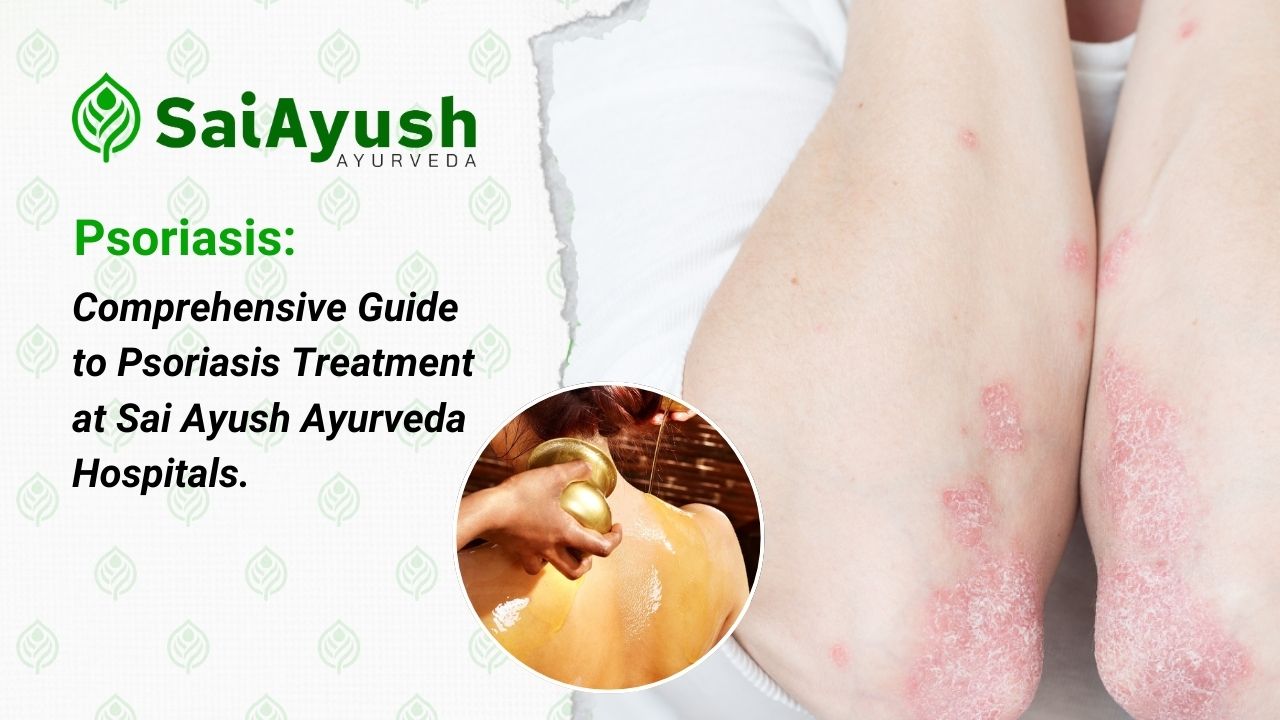Psoriasis is a chronic skin condition that affects millions worldwide. Understanding its nuances and effective treatment options is crucial for managing its symptoms and improving quality of life.
What is Psoriasis?
Psoriasis is an autoimmune condition characterised by rapid skin cell growth, resulting in thick, red patches with silvery scales. Unlike typical skin diseases, Psoriasis involves the immune system attacking healthy skin cells.
Why Choose Ayurveda for Psoriasis?
Ayurveda offers holistic approaches to Psoriasis treatment, focusing on balancing the body’s internal energies (doshas), detoxification, and natural healing. This approach not only targets symptoms but also addresses underlying imbalances.
Statistics in Hyderabad, India, and Globally
Psoriasis affects approximately 2-3% of the global population, with varying prevalence rates across regions. In Hyderabad, the prevalence is estimated to be [Insert relevant statistics if available].
Who is Frequently Affected by Psoriasis?
Psoriasis can affect individuals of any age or gender, but it often appears between ages 15 to 35. Genetic predisposition, immune system dysfunction, and environmental factors contribute to its onset.
Psoriasis Causes and Aetiology
The exact cause of Psoriasis isn’t fully understood, but it involves genetic predisposition and immune system dysfunction triggered by factors like stress, infections, and certain medications.
Signs and Symptoms of Psoriasis
Symptoms include red patches of skin covered with thick, silvery scales, itching, and sometimes pain. Psoriasis can affect any part of the body, including nails and joints.
Psoriasis Diagnosis
Diagnosis involves physical examination, medical history review, and sometimes biopsy to confirm Psoriasis and rule out other conditions.
Types of Psoriasis
Plaque Psoriasis:
- Description: Plaque Psoriasis, also known as psoriasis vulgaris, is the most common type.
- Characteristics: It appears as raised, red patches covered with a silvery white buildup of dead skin cells (scales). These patches, or plaques, often appear on the scalp, knees, elbows, and lower back.
- Symptoms: Itching and discomfort are common, and plaques can crack and bleed.
Guttate Psoriasis:
- Description: Guttate Psoriasis appears as small, dot-like lesions or drops (guttae) on the skin.
- Characteristics: These lesions are usually smaller than plaque Psoriasis lesions and often appear on the trunk, limbs, and scalp. Guttate Psoriasis is often triggered by bacterial infections such as streptococcus.
- Symptoms: It can occur suddenly and may resolve on its own or develop into other forms of Psoriasis.
Inverse Psoriasis:
- Description: Inverse Psoriasis affects skin folds and appears as bright red, shiny lesions.
- Characteristics: It commonly occurs in skin folds such as the armpits, groin, under the breasts, and around the genitals. The lesions are smooth and may be worsened by friction and sweating.
- Symptoms: Itching and discomfort are common due to the sensitivity of the affected areas.
Pustular Psoriasis:
- Description: Pustular Psoriasis is characterized by white pustules (pus-filled blisters) surrounded by red skin.
- Characteristics: It can be localized to certain areas (localized pustular Psoriasis) or cover large parts of the body (generalized pustular Psoriasis). The pustules are non-infectious and contain white blood cells.
- Symptoms: Pustular Psoriasis can cause severe pain, itching, and fever in some cases.
Erythrodermic Psoriasis:
- Description: Erythrodermic Psoriasis is the least common but most severe type.
- Characteristics: It results in widespread redness (erythema) and shedding of scales in large sheets. The skin may appear burnt and can cover the entire body surface.
- Symptoms: Erythrodermic Psoriasis can cause severe itching, pain, swelling, and fluctuating body temperature. It is a medical emergency requiring immediate attention.
Each type of Psoriasis has its own set of characteristics, symptoms, and potential triggers. Effective management often involves a tailored approach that may include lifestyle modifications, topical treatments, phototherapy, systemic medications, and Ayurvedic therapies to alleviate symptoms and improve quality of life.
Psoriasis Prevention
While Psoriasis cannot be prevented, managing triggers like stress, infections, and skin injuries can help reduce flare-ups. Maintaining a healthy lifestyle and avoiding known triggers is key.
Psoriasis Home Remedies:
Moisturisers and Emollients: Keeping the skin well-moisturised is crucial for managing Psoriasis symptoms. Use moisturisers and emollients regularly, especially after bathing, to prevent dryness and reduce itching.
Topical Herbal Pastes and Oils: Ayurvedic herbs and oils have anti-inflammatory and soothing properties that can benefit Psoriasis. Apply herbal pastes like neem, turmeric, aloe vera, and coconut oil directly to affected areas to reduce inflammation and promote healing.
Oatmeal Baths: Oatmeal is known for its skin-soothing properties and can help relieve itching and irritation. Add colloidal oatmeal to lukewarm bath water and soak for 15-20 minutes to soothe Psoriasis patches.
Avoiding Triggers: Identifying and avoiding triggers that worsen Psoriasis symptoms is essential for managing the condition.Common triggers include stress, infections, alcohol consumption, smoking, and certain medications. Minimizing exposure to these triggers can help prevent flare-ups.
Balanced Diet: A healthy diet rich in fruits, vegetables, whole grains, and lean proteins can support overall skin health.Include anti-inflammatory foods such as fish rich in omega-3 fatty acids, nuts, seeds, and foods high in antioxidants to help manage Psoriasis symptoms.
Yoga Practices for Psoriasis:
Stress Reduction through Yoga: Stress is a common trigger for Psoriasis flare-ups, and yoga can help reduce stress levels. Practice relaxation techniques such as deep breathing (pranayama), meditation, and yoga asanas that focus on calming the mind and body.
Sun Salutations (Surya Namaskar): Sun Salutations can improve circulation and flexibility while promoting overall well-being. Perform Sun Salutations daily to improve blood flow to the skin and support the body’s natural healing processes.
Twisting Asanas: Twisting poses help detoxify the body and improve digestion, which can indirectly benefit Psoriasis management. Include yoga asanas such as Ardha Matsyendrasana (Half Lord of the Fishes Pose) and Bharadvajasana (Bharadvaja’s Twist) in your practice.
Gentle Stretching and Relaxation: Gentle stretching poses and relaxation techniques can alleviate muscle tension and promote relaxation. Practise gentle yoga poses such as Balasana (Child’s Pose), Uttanasana (Standing Forward Bend), and Savasana (Corpse Pose) to release stress and tension.
Pranayama (Breathing Exercises): Pranayama techniques can enhance lung capacity, reduce stress, and improve overall respiratory health. Practise deep breathing exercises like Anulom Vilom (Alternate Nostril Breathing) and Bhramari Pranayama (Bee Breath) to calm the mind and support immune function.

psoriasis ayurvedic treatment
Ayurvedic Panchakarma Treatment Options for Psoriasis
At Sai Ayush Ayurveda Hospitals, we offer customised Panchakarma therapies to detoxify the body, balance doshas, and alleviate Psoriasis symptoms effectively. Treatments include:
- Vamana: Therapeutic vomiting to eliminate toxins.
- Virechana: Purgation therapy to cleanse the digestive tract.
- Basti: Medicated enemas to balance doshas and nourish tissues.
- Raktamokshana: Blood purification therapy to remove toxins from the blood.
FAQs
Q:What are the early signs of Psoriasis?
Early signs include red patches of skin, dryness, itching, and silvery scales.
Q:Can Psoriasis be cured permanently?
While Psoriasis is chronic, Ayurveda offers effective management and symptom relief.
Q:How does Ayurveda treat Psoriasis differently?
Ayurveda focuses on holistic healing, balancing doshas, and detoxifying the body naturally.
Q:Are there natural remedies for Psoriasis?
Yes, Ayurvedic herbs, oils, and lifestyle adjustments can help manage Psoriasis symptoms.
Q:What lifestyle changes can help manage Psoriasis?
Managing stress, maintaining a balanced diet, avoiding triggers, and practicing yoga are beneficial.
Discover the healing power of Ayurveda with our latest article at Sai Ayush Ayurveda Hospitals! Dive into the age-old wisdom that can rejuvenate your body and mind. Click here to read more:



